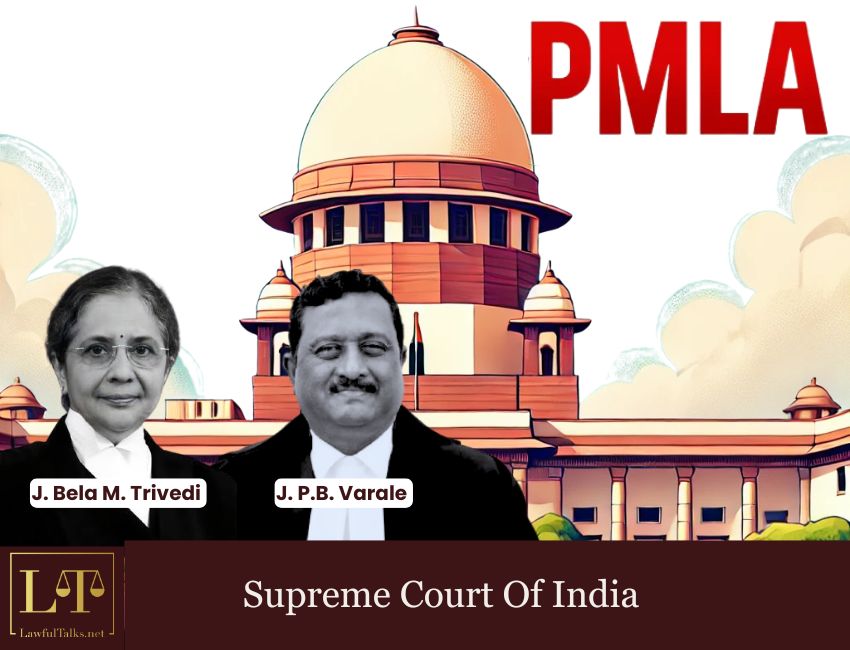Allahabad HC Sets Aside Afzal Ansari's Conviction, Allows Him to Continue as MP

Critiquing the Patna High Court approach of granting bail as "casual and cavalier" the Supreme Court has set aside the bail granted to the individual accused of committing money laundering after observing that the High Court failed to satisfy the twin conditions stipulated under Section 45 of the Prevention of Money Laundering Act, 2002 (“PMLA”).

The bench of Justice Bela M. Trivedi and Justice Prasanna B. Varale reiterated the strict interpretation of Section 45 of the PMLA act while emphasizing the grave nature of money laundering and its implications on national security and financial integrity.
The case arose from allegations of illegal mining, selling of sand, and money laundering against Kanhaiya Prasad. The Enforcement Directorate (ED) accused him of laundering proceeds of crime amounting to Rs. 17.26 crore by channeling them into purchasing properties, carrying out renovation work and constructions in the family-owned trust property.
The Supreme Court reaffirmed that the strict conditions outlined in Section 45 of the PMLA must be adhered to, even when bail is sought under Section 439 of the Cr.P.C. Furthermore, the Court emphasized the presumption under Section 24 of the PMLA, which mandates that if an individual is charged with an offence under Section 3, the Authority or Court must presume that the proceeds in question are linked to money laundering unless proven otherwise. Consequently, the burden of proof rests on the accused to establish that the assets do not originate from criminal activity.
The bench held that granting bail in PMLA cases requires strict adherence to Section 45, which mandates that:
“(i) the prosecutor must be given an opportunity to oppose the application for bail;
(ii) the Court must be satisfied that there are reasonable grounds for believing that the accused person is not guilty of such offence and that he is not liable to commit any offence while on bail.”
The court emphasized that the above-mentioned twin conditions have been reiterated time and again in the judgments of Vijay Madanlal Choudhary & Ors. Vs. Union of India & Ors.,2022 SCC OnLine 929, Tarun Kumar Vs. Assistant Director Directorate of Enforcement., (2023) SCC OnLine 1486.
While setting aside the High Court’s order, the bench noted that “the High Court in a very casual and cavalier manner, without considering the rigours of Section 45 granted bail to the respondent on absolutely extraneous and irrelevant considerations. There is no finding whatsoever recorded in the impugned order that there were reasonable grounds for believing that the respondent was not guilty of the alleged offence under the Act and that he was not likely to commit any offence while on bail. Noncompliance of the mandatory requirement of Section 45 has, on the face of it, made the impugned order unsustainable and untenable in the eye of law.”
Additionally, the Court addressed the applicability of Article 20(3) of the Constitution, which protects an accused from self-incrimination. The Respondent had contended that statements recorded under Section 50 of PMLA were inadmissible as they violated Article 20(3). However, the Court, citing Vijay Madanlal Choudhary (supra), rejected this argument and held, “ It has been further observed that Article 20(3) of the Constitution would not come into play in respect of the process of recording statement pursuant to such summon issued under sub-section (2) of Section 50. The phrase used in Article 20(3) is “to be a witness” and not to “appear as a witness”. It follows that the protection afforded to an accused insofar as it is related to the phrase “to be a witness” is in respect of testimonial compulsion in the court room, and it may also extend to compelled testimony previously obtained from him. It is available therefore to a person against whom a formal accusation relating to the commission of an offence has been levelled, which in the normal course may result in a prosecution.”
The bench strongly emphasized that the offence of money laundering is not an ordinary offense. It has been regarded as an aggravated form of crime world over, and the offenders involved in the activity connected with the Proceeds of Crime are treated as a separate class from ordinary criminals. Further, the court cautioned against any casual or cursory approach by the courts while considering the bail application of the offender involved in the offence of money laundering. It also mentioned that granting the accused bail by passing cryptic orders without considering the seriousness of the crime and without considering the rigours of Section 45 is not justifiable.
Accordingly, the court set aside the High Court order as it was in the teeth of Section 45 of PMLA and also in the teeth of the settled legal position. The matter is remanded to the High Court for consideration afresh with the request to the Chief Justice to place the matter before the Bench other than the Bench which had passed the impugned order.
Case Title: The Union Of India Through The Assistant Director v. Kanhaiya Prasad., Criminal Appeal No. 728 Of 2025
Advocate For Petitioner(s): Mr. Zoheb Hussain, Adv., Mr. Arvind Kumar Sharma, AOR & Ors
Advocate For Respondent(s) : Mr. Ranjit Kumar, Sr. Adv., M/S. SAA Chambers, AOR & Ors

Akshaj Joshi
Law Student
Latest Posts
Categories
- International News 19 Posts
- Supreme Court 352 Posts
- High Courts 366 Posts




























































































































































































































































































































































































































































































































































































































































































































































